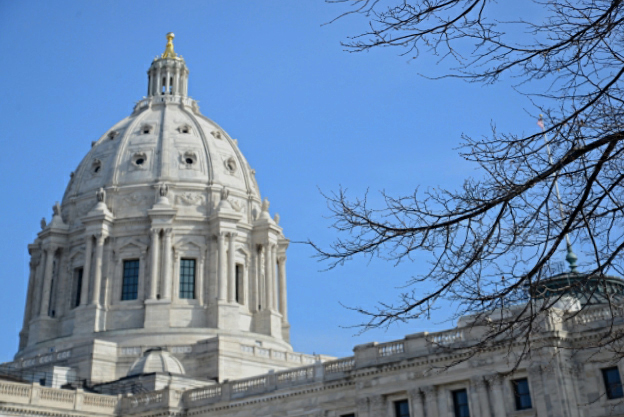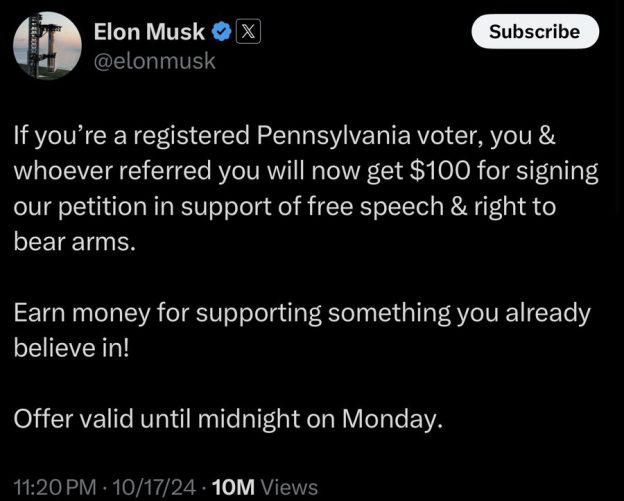

Connie’s Law
Before we get to the Edina situation, here’s a bit about the the problem nationally. On October 16th, ProPublica published an article by Phoebe Petrovic of Wisconsin Watch entitled:
You might be looking for Phoebe Petrovic’s byline.
I encourage you to read the article, but here’ s the gist of the game that’s afoot:
Ahead of the 2024 election, activists have taken steps to get closer to the action. A coalition of activists on the political right, many of whom have promoted false claims about election fraud, is recruiting poll workers to administer the process themselves rather than watching from the outside. The groups are urging people to work at their local polling stations and to report perceived irregularities to those groups’ external hotlines [emphasis added] — something that could risk violating the law.
One of the leaders of this initiative is Lance Wallnau, a Christian nationalist partisan. Here’s part of the description of Wallnau in a YouTube video posted by the Living Word Christian Center:
This last weekend [in January of this year], we had a very special guest minister, Lance Wallnau, at our weekend services. Lance is well known for his revelation of the “Seven Mountains of Influence” and how these mountains of influence shape and change the world. He preached about how God is calling the church to make disciples of nations. And in order to do that, we need strong, territorial churches that are raising up believers to go out and become the “head and not the tail.” Lance basically taught on the same thing at all three services but much of the information he shared in each service differed.
In the 1970’s, the Seven Mountains Mandate was constructed out of whole cloth from a passage in the Book of Revelation, also known as the Gospel According to Fellini. It is expressly and overtly political, literally a plan for world domination. Places like the Living Word Christian Center preach it from the pulpit.
As the article describes, poll workers are different than poll watchers. Poll workers, usually called election judges, are appointed and paid by the organization administering the election, ordinarily a city or county. Election judges take an oath. Representing an outside group – say a candidate or a campaign or other partisan organization – and reporting to them is not part of the job description. The conflict of interest is obvious and it’s concerning. It’s also not theoretical, even in Edina.
In recent weeks, Connie Carrino, the campaign manager for the local non-incumbent city council candidate, Ryan Daye, sought to serve as an election judge at the polls here in Edina, Minnesota. At a campaign event, a supporter of one of the incumbent candidates, Carolyn Jackson, asked Daye whether this was advisable or legal. The campaign manager went, to put it charitably, ballistic. She spread the story far and wide, claiming that as the delicate flower she is, that she was “intimidated.” Supporters of Daye and the non-incumbent candidate for mayor, Ron Anderson, have amplified the message. Carrino took her name off the election judge rolls in Edina. She also filed an election practices complaint with the Minnesota Office of Administrative Hearings which dismissed the complaint instantly.
That hasn’t prevented Carrino and her fellow malcontent travelers from braying incessantly at the unfairness of it. It is perfectly fair, though, to question a person who wants to be both a judge and an advocate. We shouldn’t tolerate it; we don’t in most settings.
But disturbingly, Minnesota law does not prohibit a campaign manager from serving as an election judge in the contest where the manager’s candidate stands for election. Here’s Minn. Stat. § 204B.19, Subd. 2 (2023):
Individuals not qualified to be election judges.
(a) Except as provided in paragraph (b), no individual shall be appointed as an election judge for any precinct if that individual:
(1) is unable to read, write, or speak the English language;
(2) is the spouse; parent, including a stepparent; child, including a stepchild; or sibling, including a stepsibling; of any election judge serving in the same precinct or of any candidate at that election;
(3) is domiciled, either permanently or temporarily, with any candidate on the ballot at that election; or
(4) is a candidate at that election.
(b) Individuals who are related to each other as provided in paragraph (a), clause (2), may serve as election judges in the same precinct, provided that they serve on separate shifts that do not run concurrently.
Essentially, if you aren’t the candidate, or living with one, and you can read, write, and speak English, you can be an election judge. You can be a campaign manager, a campaign worker or agent, even a paid one, and be an election judge in a precinct where your candidate stands for election. It’s an obvious conflict of interest. It doesn’t pass the smell test.
To be frank, this is nuts.
There are states that believe this is a bad idea. Minnesota should, too. Let’s zoom out from the Edina city council race for a moment. Under Minn. Stat. § 204B.19, Subd. 2 (2023), what would prevent a national candidate for president from recruiting – hiring, even – people to become election judges and then be agents for the candidate’s campaign?
Nothing is the right answer.
Lest you think that paying to induce citizens to take action concerning an election is farfetched, please consider this recent tweet – yes, tweet – from Elon Musk. Here Musk is asking for petition signers, obviously to identify voters for Republicans to contact, perhaps necessary because of their dismal GOTV apparatus.

Elon Musk’s offer
It isn’t hard to imagine, though, a wealthy person or organization, either national or even just local, paying individuals for other things, such as becoming election workers to spy at the polls and report on it, from the inside. The election judge’s oath, while offering blandishments about fair administration, doesn’t prohibit it. (It is worth noting that paying something of value for a vote is a felony in Minnesota.)
You should never assume that shenanigans don’t occur in election administration at the polls in Minnesota. Twelve years ago, during the height of the febrile Tea Party era, I presented myself to vote in Edina, gave my name, and the election judge looked me up. This was long enough ago that books were still used, and the election judge turned the book around, but before sliding it over for me to sign, she stabbed the language at the top of the page with her finger and demanded, “Do you know what this?”
I smiled, and without looking down, replied, “It’s my oath as a voter, that I am a citizen, at least eighteen years of age, live in the precinct, and am under no disability to vote.” She looked disappointed at not being able to deliver her lecture and pushed the book over to me to sign. I spoke to the city clerk about her later.
The election judge’s imperious and accusatory tone was obviously intended to intimidate. Let’s not make it worse by inviting the agents of candidates into the polls to judge voters.
Minnesota election law ought to be changed to:
- Prohibit campaign officers, employees, and other agents from serving as election judges in precincts where their candidate stands for election.
- Strengthen the election judges’ oath to prohibit judges from being in contact with candidates or their campaigns or party while serving as an election judge at the polls and prohibiting their receiving any compensation for election judge service except for that received from the election organizer. There should also be in the judges’ oath an express undertaking not to engage in intimidating behavior.
- Provide clear and better standards for the treatment of voters by election judges, including inter alia, how to explain to voters in a non-intimidating way the oath they are making.
We could call it “Connie’s Law.”
Update 10/22/24: The GOP’s tour to recruit election judges passed through Minnesota.
Thanks for your feedback. If we like what you have to say, it may appear in a future post of reader reactions.

